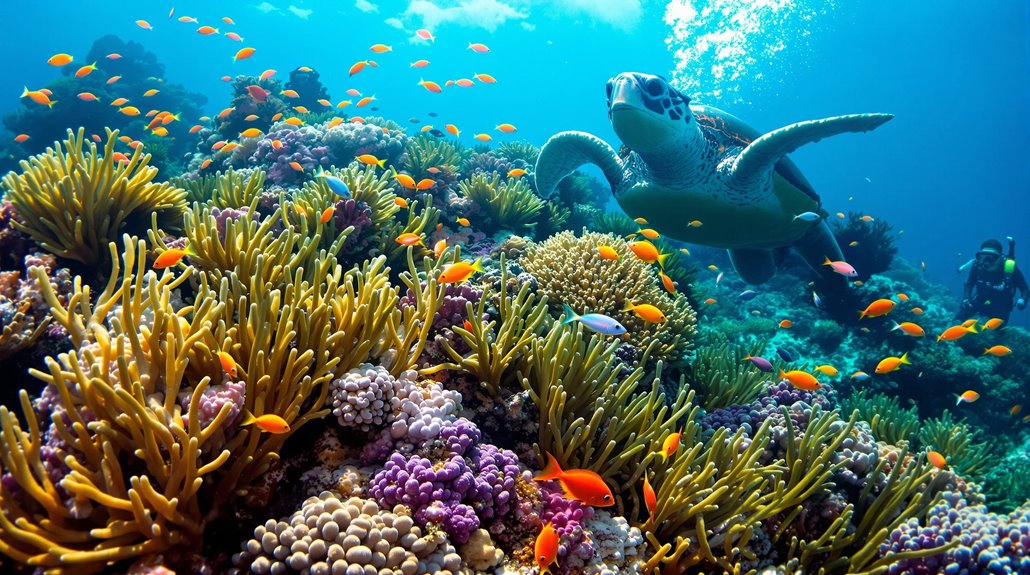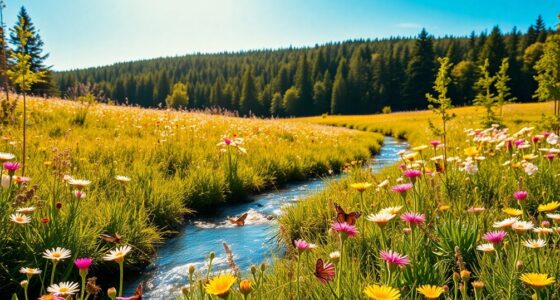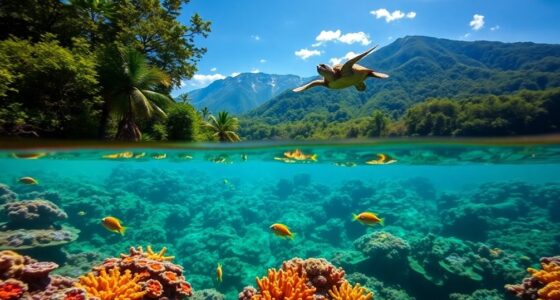Biodiversity is essential for your survival and well-being. It supports fundamental ecosystem services like pollination, water purification, and soil fertility, contributing around $125 trillion annually to the global economy. Healthy ecosystems guarantee food security and provide medicinal resources, with many modern drugs derived from various species. In addition, biodiversity enhances ecological resilience, allowing life to adapt to environmental changes. As habitats face threats from climate change and pollution, protecting biodiversity becomes increasingly important. Understanding its significance can empower you to make a difference and protect our planet's delicate balance. More insights await as you explore this fascinating topic more.
Key Takeaways
- Biodiversity ensures ecosystem resilience, allowing environments to adapt and thrive amidst changes, maintaining balance in nature.
- It provides essential ecosystem services like pollination, water purification, and soil fertility, crucial for human survival.
- The economic value of biodiversity supports industries such as agriculture and tourism, contributing significantly to the global economy.
- Genetic diversity within species allows for adaptation to environmental changes, vital for long-term ecological stability.
- Conservation of biodiversity helps prevent species extinction, preserving potential medical cures and maintaining ecological integrity.
Ecological Health and Stability

While biodiversity might seem like a distant concern, it plays an essential role in ensuring ecological health and stability.
When you consider species diversity, you realize that a variety of organisms contributes considerably to ecosystem resilience. Genetic diversity within species allows them to adapt to environmental changes, ensuring their survival. Reduced biodiversity threatens vital ecosystem functions, such as pollination and water purification, emphasizing the need for conservation efforts.
Furthermore, the different ecosystems in a region bolster overall ecological health. The relationships among organisms create complex food webs, maintaining balance and sustainability over time. This dynamic characteristic requires continuous adaptation to thrive.
By understanding how extinction and colonization maintain this balance, you can appreciate the intricate processes that support the ecosystems you depend on every day.
Biodiversity isn't just important; it's crucial for a thriving planet.
Medicinal and Agricultural Benefits

Biodiversity isn't just fundamental for ecological health; it also underpins significant medicinal and agricultural benefits. Many modern drugs, like Taxol and artemisinin, come from specific plants, while others, like ziconotide, derive from animal sources. These medicines tackle serious health issues like cancer and malaria. If we lose biodiversity, we risk losing potential cures for these ailments.
In agriculture, crop diversity is essential for food security. It helps breeders create new crop varieties and guarantees sustainable practices. Additionally, the loss of crop diversity jeopardizes food security, as it limits the genetic variation necessary for breeding resilient crops.
Furthermore, ecosystems provide crucial services such as pollination and pest control, which are fundamental for successful farming. If we continue to diminish biodiversity, food production could become more costly or even impossible, threatening our ability to feed the growing population.
Ecosystem Services

Ecosystem services play an essential role in sustaining life on Earth, directly impacting our daily lives and well-being. They provide crucial resources, like food, fresh water, and medicinal plants, essential for your health and livelihood.
Ecosystems regulate climate, improve air and soil quality, and control flooding and erosion, ensuring a safer environment. They support biodiversity, maintaining habitats and nutrient cycling crucial for plant growth. Biodiversity supports ecosystem functioning by enhancing pollination and nutrient cycling, which are vital for agricultural productivity.
Additionally, they offer recreational opportunities and aesthetic value, enriching your life while fostering community connections. By understanding and valuing these services, you can appreciate how ecosystems contribute to your well-being and recognize the importance of preserving biodiversity for future generations.
Environmental Adaptation

As environmental conditions change, the ability of ecosystems to adapt becomes increasingly crucial for maintaining their functions and supporting human life. Diverse ecosystems enhance resilience, sequestering carbon to mitigate climate change effects. When biodiversity is high, ecosystems can better withstand stress, ensuring critical processes continue. This "insurance effect" means that as some species adapt to new conditions, others can fill in gaps, preserving ecosystem functions. Additionally, biodiverse ecosystems are less vulnerable to extinction and recover faster from disturbances. By regulating temperature, providing necessary services like water purification, and supporting food security, these ecosystems not only protect nature but also bolster human adaptation, enriching our lives and safeguarding our future. Furthermore, the conservation of biodiversity is essential for ecosystem resilience, enabling ecosystems to thrive amid changing conditions.
Conservation and Protection

Conservation and protection of our planet's natural resources are critical to ensuring a sustainable future for all living beings. You can actively contribute through in-situ conservation by supporting national parks and wildlife sanctuaries, which maintain ecosystems and allow species to evolve naturally. Ex-situ conservation also plays a role, as breeding endangered species in controlled environments helps preserve genetic diversity. Implementing effective strategies, like reducing pollution and prohibiting deforestation, further protects biodiversity. In-situ methods such as national parks not only help safeguard various species but also support ecological balance and biodiversity resilience. Raising public awareness about the significance of these efforts empowers communities to participate in conservation initiatives.
Global Impact

Understanding the importance of conservation and protection leads us to recognize the broader consequences of biodiversity loss on a global scale.
Land use changes, like habitat destruction and deforestation, account for about 30% of biodiversity decline. Urban sprawl and agricultural expansion further threaten countless species. This land use change not only leads to habitat loss but also fragmentizes ecosystems, making it difficult for species to thrive.
Overexploitation through overfishing, overhunting, and wildlife trade accelerates this decline.
Climate change disrupts ecosystems, forcing species to migrate and reducing genetic diversity.
Pollution from pesticides, fertilizers, and plastic waste harms aquatic life and soil health.
Additionally, invasive alien species outcompete native populations, altering habitats.
Each of these factors not only impacts individual species but also disrupts the delicate balance of ecosystems, affecting our planet's health and our own well-being.
Future of Biodiversity

While the future of biodiversity faces significant challenges, innovative strategies and collective action can pave the way for recovery.
You'll see increased efforts to stop deforestation, transforming food systems and land use. Global pledges, like the trillion trees movement, will gain traction, emphasizing quality restoration for ecosystems and communities. Additionally, achieving nature-positive goals requires sustained collective action and commitment from all sectors.
To bridge the $700 billion financing gap, biodiversity credits can support essential habitats and sustainable management. You can also expect adaptive strategies to control invasive species and enhance habitat connectivity.
However, with rapid biodiversity decline and global extinction rates exceeding historical norms, it's important to prioritize conservation in land-use decisions.
Together, we can create a resilient future for biodiversity that benefits both nature and humanity.
Frequently Asked Questions
How Does Biodiversity Affect Climate Change?
Biodiversity affects climate change by enhancing carbon sequestration and storage. When you protect diverse ecosystems like forests and wetlands, you're helping them absorb carbon dioxide, which mitigates climate change.
These ecosystems also provide essential services, such as regulating climate and improving resilience to environmental shocks. By preserving biodiversity, you're not only supporting these natural processes but also reducing the risks of extinction and ensuring the stability of food systems for future generations.
What Role Do Humans Play in Biodiversity Loss?
Did you know that over 3.3 million hectares of forest were lost between 2010 and 2015?
You play a significant role in biodiversity loss through activities like deforestation, overfishing, and pollution.
When you expand urban areas or use pesticides, you're contributing to habitat destruction and species decline.
Even choices like buying timber and consuming fish can deplete ecosystems.
It's crucial to reflect on your impact and make more sustainable choices to help preserve biodiversity.
How Can Individuals Contribute to Biodiversity Conservation?
You can contribute to biodiversity conservation in several meaningful ways.
Start by educating yourself and others about local ecosystems and their needs.
Adopt a sustainable lifestyle by reducing waste and supporting eco-friendly products.
Get involved in community initiatives like gardens or habitat restoration projects.
Additionally, consider volunteering for local conservation efforts or donating to organizations focused on preserving biodiversity.
Every small action you take can help create a healthier environment for all.
What Are the Economic Benefits of Preserving Biodiversity?
Preserving biodiversity is like tending a garden; each species is a flower, essential to the ecosystem's beauty and health.
When you protect biodiversity, you reap economic rewards—boosting customer loyalty and attracting eco-conscious consumers.
You'll find new markets blooming as innovation flourishes, and sustainable sourcing strategies can cut costs while minimizing ecological damage.
Ultimately, your commitment to biodiversity enhances your brand's reputation, drawing in investments and ensuring a thriving future for your business.
How Does Urbanization Impact Local Biodiversity?
Urbanization greatly impacts local biodiversity by destroying and fragmenting habitats.
As cities expand, you see natural areas vanish, leading to a sharp decline in species populations. The construction of roads and buildings isolates wildlife, making it harder for them to thrive.
Altered environments, like urban heat islands and increased pollution, further disrupt ecosystems.
You'll notice that native species are often replaced by non-native ones, resulting in a less diverse biological landscape.
Conclusion
So, if you think biodiversity isn't essential, just wait until you're sipping your morning coffee made from a single type of bean grown in a sterile lab. Imagine a world where your favorite fruits and veggies vanish because we've put all our eggs in one basket. Biodiversity's not just a nice-to-have; it's the insurance policy for life on Earth. Embrace it, or you might be left reminiscing about that time when nature actually had a sense of humor.









